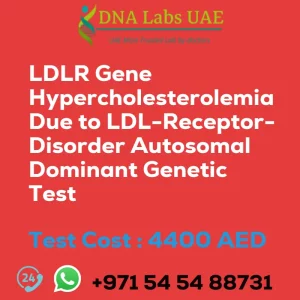AKT2 Gene Hypoinsulinemic hypoglycemia with hemihypertrophy Genetic Test
Are you or your loved ones experiencing symptoms of hypoglycemia with hemihypertrophy? DNA Labs UAE offers the AKT2 Gene Hypoinsulinemic hypoglycemia with hemihypertrophy Genetic Test to help diagnose this condition. Read on to learn more about the test, its components, cost, symptoms, diagnosis, and more.
Test Details
The AKT2 gene is responsible for producing a protein called protein kinase B (PKB), which plays a crucial role in various cellular processes, including glucose metabolism regulation. Hypoinsulinemic hypoglycemia is a condition characterized by low blood sugar levels due to inadequate insulin production. On the other hand, hemihypertrophy is a condition where one side of the body experiences asymmetric overgrowth.
The AKT2 Gene Hypoinsulinemic hypoglycemia with hemihypertrophy Genetic Test utilizes Next-Generation Sequencing (NGS) technology to analyze multiple genes simultaneously. This advanced genetic testing method involves sequencing the AKT2 gene to identify any genetic variations or mutations associated with the condition.
Test Components and Cost
- Test Name: AKT2 Gene Hypoinsulinemic hypoglycemia with hemihypertrophy Genetic Test
- Components: NGS Technology
- Price: 3200.0 AED
- Sample Condition: Blood
- Report Delivery: 3 to 4 Weeks
- Test Type: Metabolic Disorders
- Doctor: General Physician
- Test Department: Genetics
Symptoms and Diagnosis
Individuals with hypoinsulinemic hypoglycemia with hemihypertrophy may experience symptoms such as low blood sugar levels, asymmetric overgrowth of one side of the body, and other related complications. If you or your family members are experiencing these symptoms, it is important to consult a general physician for further evaluation.
Before undergoing the AKT2 Gene Hypoinsulinemic hypoglycemia with hemihypertrophy Genetic Test, a genetic counseling session will be conducted to gather the clinical history of the patient and create a pedigree chart of family members affected by the condition. This information will help in determining the genetic basis of the condition and guide the testing process.
Why Choose AKT2 Gene Hypoinsulinemic hypoglycemia with hemihypertrophy Genetic Test?
By identifying specific genetic variations in the AKT2 gene, the NGS genetic testing can provide valuable insights into the underlying cause of hypoinsulinemic hypoglycemia with hemihypertrophy. This information can assist healthcare professionals in making accurate diagnoses and potentially guide treatment decisions.
Don’t wait any longer! Contact DNA Labs UAE today to schedule an appointment for the AKT2 Gene Hypoinsulinemic hypoglycemia with hemihypertrophy Genetic Test. Early detection and diagnosis can lead to better management of this condition.
| Test Name | AKT2 Gene Hypoinsulinemic hypoglycemia with hemihypertrophy Genetic Test |
|---|---|
| Components | |
| Price | 3200.0 AED |
| Sample Condition | Blood |
| Report Delivery | 3 to 4 Weeks |
| Method | NGS Technology |
| Test type | Metabolic Disorders |
| Doctor | General Physician |
| Test Department: | Genetics |
| Pre Test Information | Clinical History of Patient who is going for AKT2 Gene Hypoinsulinemic hypoglycemia with hemihypertrophy NGS Genetic DNA Test A Genetic Counselling session to draw a pedigree chart of family members affected with Hypoinsulinemic hypoglycemia with hemihypertrophy |
| Test Details | The AKT2 gene is a gene that provides instructions for making a protein called protein kinase B (PKB). PKB is involved in many cellular processes, including the regulation of glucose metabolism. Hypoinsulinemic hypoglycemia is a condition characterized by low blood sugar levels due to insufficient insulin production. Hemihypertrophy, on the other hand, is a condition characterized by an asymmetric overgrowth of one side of the body. NGS (Next-Generation Sequencing) genetic testing is a type of genetic test that uses advanced sequencing technology to analyze multiple genes simultaneously. In the context of AKT2 gene hypoinsulinemic hypoglycemia with hemihypertrophy, NGS genetic testing would involve sequencing the AKT2 gene to identify any genetic variations or mutations that may be associated with the condition. By identifying specific genetic variations in the AKT2 gene, NGS genetic testing can help in diagnosing individuals with hypoinsulinemic hypoglycemia with hemihypertrophy. This information can be useful for understanding the underlying cause of the condition and potentially guiding treatment decisions. |







